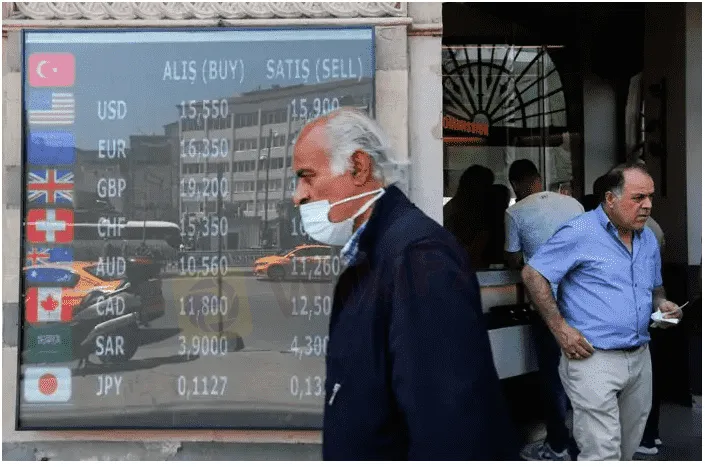简体中文
繁體中文
English
Pусский
日本語
ภาษาไทย
Tiếng Việt
Bahasa Indonesia
Español
हिन्दी
Filippiiniläinen
Français
Deutsch
Português
Türkçe
한국어
العربية
Turkish lira on slow slide in search of FX relief
Abstract: The Turkish lira slipped again on Monday, sustaining a slow slide towards 18 against the dollar as concerns mounted about the government’s foreign exchange policy in the face of surging inflation and fears of global recession.

The slow depreciation could continue unless authorities find a new source of foreign funds to buffer depleted official reserves, analysts say. Adding to uncertainty over coming weeks, corporate depositors will decide whether to largely stick with special state-backed lira-protected accounts.
The lira weakened as much as 0.4% to 17.8335 against the U.S. currency, trading at its weakest levels since a full-blown currency crisis in December, when it hit an all-time low of 18.4.
“We are seeing the lira losing limited value each day with the current policy. The balance in forex can only be achieved with the lira losing value, albeit limited,” said a treasury desk trader at one bank.
The lira has steadily weakened 6.3% this month.
The Turkish Central Bank‘s quarterly inflation report on Thursday and the U.S. Federal Reserve’s expected 75 basis-point interest rate hike on Wednesday were set to be key focuses of attention for investors this week.
On Thursday the Turkish central bank is expected to again raise its end-year inflation forecast from 42.8% previously. According to a Reuters poll, annual inflation is expected to be 70% by end-2022. It hit a 24-year high near 80% last month.
The rampant inflation was triggered by a series of unorthodox interest rate cuts which knocked 44% off the liras value last year. It has weakened another 26% this year.
Despite the unrelenting depreciation, the central bank is expected to keep its policy rate steady at 14% for at least another year, focusing instead on macro-prudential measures on loans and liquidity.
The central banks net forex reserves have tumbled to just over $6 billion this month, the lowest levels since 2002, with bankers calculating forex reserves excluding swaps to be minus $55 billion.
The treasury desk trader said a big question is whether new foreign forex resources will flow into Turkey, given the need for fresh resources is at unprecedented levels.
Authorities sought to stem the liras decline from the end of last year with special bank accounts, dubbed KKM, protecting savers and corporates from large lira falls to discourage hoarding of U.S. dollars, euros or gold.
“Markets are monitoring the rollover of corporates KKMs which begin this week and intensify over 3-5 weeks. We have not yet seen heavy forex demand due to KKM. But the issue of whether KKM rollovers will create forex demand will be important for the course of the lira,” the trader said.

Disclaimer:
The views in this article only represent the author's personal views, and do not constitute investment advice on this platform. This platform does not guarantee the accuracy, completeness and timeliness of the information in the article, and will not be liable for any loss caused by the use of or reliance on the information in the article.
Read more

Never Heard of Dynasty Trade? Here's Why You Should Be Worried
Have you heard this name before? No , it’s time you do because staying unaware could cost you. This platform is currently active in the forex trading and has been linked to several suspicious activities. Even if you’ve never dealt with it directly, there’s a chance it could reach out to you through ads, calls, messages, or social media. That’s why it’s important to know the red flags in advance.

Want to Deposit in the EVM Prime Platform? Stop Before You Lose It ALL
Contemplating forex investments in the EVM Prime platform? Think again! We empathize with those who have been bearing losses after losses with EVM Prime. We don't want you to be its next victim. Read this story that has investor complaints about EVM Prime.

WEEKLY SCAM BROKERS LIST IS OUT! Check it now
If you missed this week's fraud brokers list and are finding it difficult to track them one by one — don’t worry! We’ve brought together all the scam brokers you need to avoid, all in one place. Check this list now to stay alert and protect yourself from fraudulent brokers.

Catch the Latest Update on BotBro & Lavish Chaudhary
BotBro, an AI-based trading platform, became popular in India in 2024—but for negative reasons. Its founder, Lavish Chaudhary, who gained a huge following by promoting it heavily on social media. Since then, he has become well-known, but for many controversies. Let’s know the latest update about Botbro & Lavish Chaudhary.
WikiFX Broker
Latest News
Asia-Pacific stocks fall as investors weigh recent trade developments
Is Your Forex Strategy Failing? Here’s When to Change
FSMA Warns That Some Firms Operate as Pyramid Schemes
Apex Trader Funding is an Unregulated Firm | You Must Know the Risks
LVMH shares jump 2.5% after reporting better-than-feared earnings, Texas factory plans
Why Octa Is the Ideal Broker for MetaTrader 4 & 5 Users
Stop Level Forex: How Does it Help Traders Prevail When Losses Mount?
5 things to know before the Thursday open: Meme stock revival, Trump's Fed visit, Uber's gender feature
CNBC's Inside India newsletter: Leaving, but not letting go — India's wealthy move abroad, but stay invested
Moncler raises prices on tariffs, may postpone store openings if downturn worsens
Currency Calculator


